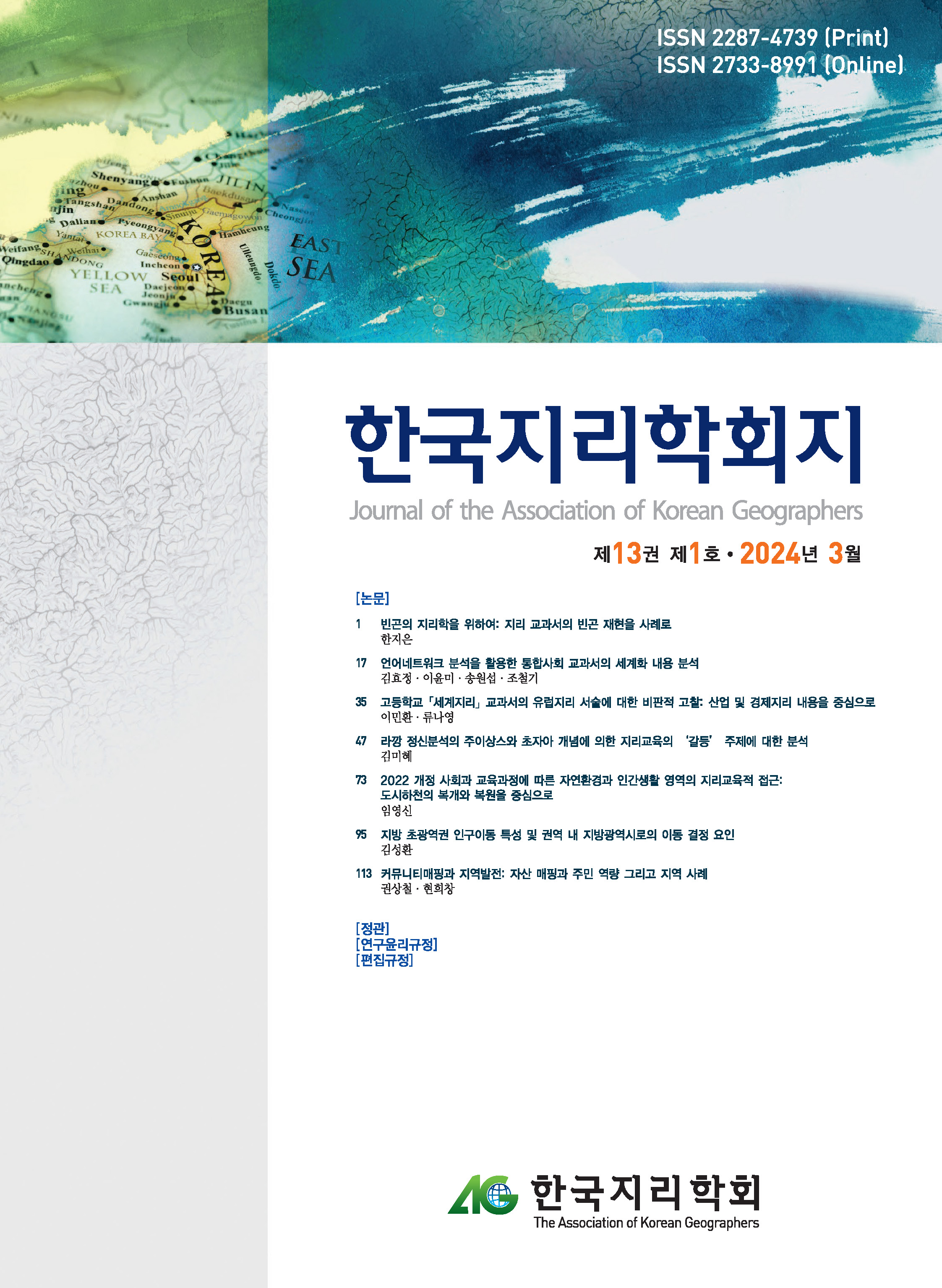Research Article
Abstract
References
Information
This study assumes that the superego, one of the human Psychic agency pursues an insidious jouissance, causing human conflict with others. Accordingly, the purpose of this study is to interpret the causes of human conflict, which is an important topic in geography education, based on the perspectives of jouissance and superego. It is assumes that humans have lost the jouissance they previously had in order to enter the world of law. Therefore, subject comes to desire the lost object a in order to fill the lack of the castrated position. Humans should have enjoyment by discerning ‘objet petit a’ in an ethical manner, but due to the manifestation of the superego, they believe that ‘objet petit a’ has been stolen by others. Therefore, humans hate others who illegally occupies one’s ‘objet petit a’, humans experience extreme conflict. There are many situations where the superego tries to enjoy jouissance in an unethical way, mainly in the areas of religion, race, ethnicity, and politics. In order for students to live together with the geographical others in an ethical way, it is necessary to suppress the expression of the superego, which seeks to gain enjoyment by considering the others illegally. Accordingly, it is necessary to guide students through geography education so that they can discern ‘objet petit a’ and obtain ethical enjoyment. In conclusion, it is important to know that the ‘objet petit a’ is shared between I and the other, and Lacan’s humanistic value of ‘I am the other and the other is I’ needs to be incorporated into geography education.
본 논문은 인간의 정신적 행위자중 하나인 초자아가 음험한 주이상스를 추구함으로써 인간이 타자와의 갈등을 유발한다고 보고 있다. 이에 본 연구는 지리교육에서 중요하게 다루는 인간 간의 갈등의 원인을 주이상스와 초자아의 관점에 기반하여 해석하는 것을 목적으로 한다. 인간은 법의 세계에 진입하기 위해 이전에 가졌던 향락을 거세당했다고 여긴다. 따라서 인간은 거세당한 자리의 결핍을 채우기 위해 잃어버렸던 대상 a를 욕망하게 된다. 인간은 윤리적인 방식으로 대상 a를 분별함으로써 향락을 누려야 하는데, 초자아의 발현으로 인해 대상 a를 타자가 절도했다고 여긴다. 따라서 인간은 자신의 대상 a를 불법적으로 점유한 타자를 증오함으로써, 나와 타자는 극심한 갈등을 겪게 된다. 주로 종교・인종・민족・정치 영역에서 초자아가 비윤리적인 방식으로 주이상스를 향유하려는 정황이 많이 드러난다. 학생들이 지리적 타자와 윤리적인 방식으로 더불어 살기 위해서는 타자를 불법적으로 간주함으로써 향락을 얻으려는 초자아의 발현을 억제할 필요가 있다. 이에 지리교육을 통해 학생이 대상 a를 끝까지 분별하여 윤리적인 향락을 얻을 수 있도록 지도할 필요가 있다. 결론적으로 나와 타자가 대상 a를 공유한 관계라는 것을 아는 것이 중요하며, ‘내가 타자이고 타자가 나’라는 라깡의 인문학적 가치가 지리교육에 접목될 필요가 있다.
- Barnard-Naudé, J., 2021, An Ordeal of the Real: Shame and the Superego, Acta Academica, 53(1), 1-22. 10.18820/24150479/aa53i1.1
- Bjerre, H.J., 2023, Master, Don’t You See That I Am Learning?, Problemi, 61(11-12), 247-262.
- Blanuša., N. and Jerbić, V., 2021, Enjoying an Empty Edifice: Nationalism Through the Lenses of Lacanian Psychoanalysis, Anali Hrvatskog Politološkog Društva, 18(1), 303-323. 10.20901/an.18.13
- Copjec, J., 2002, Imagine There’s NoWoman: Ethics and Sublimation, Cambridge, MA: MIT Press. 10.7551/mitpress/3668.001.0001
- De Chavez, C., 2015, Superego Injunction: Why Yes Means No, Golden Line, 26-29.
- Evans, D., 1996, An Introductory Dictionary of Lacanian Psychoanalysis, London: Routledge(강성룡・권희영・김병준・김종주・손병우・신명아・이수연・이만우・이유섭・이윤희・조중근・한영구 역, 1998, 「라깡 정신분석 사전」, 서울: 인간사랑).
- Floury, N., 2010, Le Réel Insensé - Introduction à la Pensée de Jacques-Alain Miller, France: Germina(임창석 역, 2022, 「상식을 넘어선 현실계- 자크 알랭 밀레와 라캉 오리엔테이션」, 성남: EDITUS).
- Harrison, N., 2012, Aborigines of the Imaginary: Applying Lacan to Aboriginal Education, Asia-Pacific Journal of Teacher Education, 40(1), 5-14. 10.1080/1359866X.2011.643764
- Homer, S., 2005, Jacques Lacan, London: Routledge(김서영 역, 2006, 「라깡 읽기」, 서울: 은행나무). 10.4324/9780203347232
- Hook. D., 2017, What is “Enjoyment as a Political Factor”?, Political Psychology, 38(4), 605-620. 10.1111/pops.12417
- Hook, D., 2018, Racism and Jouissance: Evaluating the “Racism as (the Theft of) Enjoyment” Hypothesis, Psychoanalysis, Culture & Society, 23, 244–266. 10.1057/s41282-018-0106-z
- Kingsbury, P., 2011, The World Cup and the National Thing on Commercial Drive, Vancouver, Environment and Planning D: Society and Space, 29(4), 716-737. 10.1068/d4410
- Lacan. J., 1988, Freud’s Papers on Technique, 1953-1954 (The Seminar of Jacques Lacan; Book 1), New York: Norton.
- Lacan, J., 2006, Ecrits: The First Complete Edition in English, New York and London: W.W. Norton.
- Langton, M., 2003, Aboriginal Art and Film: The Politics of Representation, in Grossman, M., eds., Blacklines: Contemporary Critical Writing by Indigenous Australians, Melbourne: Melbourne University Press.
- Lévi-Strauss, C., 1989, Strukturalna Antropologija, Zagreb: Stvarnost.
- Lichtenberg, J.D., 2004, Commentary on “The Superego-a Vital or Supplanted Concept?, Psychoanalytic Inquiry, 24(2), 328-339. 10.1080/07351692409349086
- McGowan, T., 2004 , The End of Dissatisfaction? Jaques Lacan and the Emerging Society of Enjoyment, Albany NY: SUNY Press. 10.1353/book4760
- Nedoh, B., 2020, Now I Am Become Death, Destroyer of Worlds’: Science, Perversion, Psychoanalysis, Journal for Cultural Research, 24(4), 315-333. 10.1080/14797585.2020.1861811
- Neill, C., 2005, The Locus of Judgement in Lacan’s Ethics, Journal for Lacanian studies, 3, 85-100.
- Salecl, R., 1993, The Spoils of Freedom: Psychoanalysis and Feminism After the Fall of Socialism, London and New York: Routledge.
- Satrapi, M., 2006, Persepolis, London: Random House.
- Schweber, S.S., 2009, Einstein and Oppenheimer: The Meaning of Genius, Cambridge, MA: Harvard University Press. 10.4159/9780674043350
- Stavrakakis, Y., 2007, The Lacanian Left: Psychoanalysis, Theory, Politics, Edinburgh: Edinburgh University Press. 10.3366/edinburgh/9780748619801.001.000117715358PMC6672189
- Thorpe, C., 2006, Oppenheimer: The Tragic Intellect, Chicago: Chicago University Press. 10.7208/chicago/9780226798486.001.0001
- Žižek, S., 1989, The Sublime Object of Ideology, New York: Verso.
- Žižek, S., 1991, Looking Awry: An Introduction to Jacques Lacan through Popular Culture, London: The MIT Press.
- Žižek, S., 1993, Tarrying with the Negative, Durham: Duke University Press. 10.2307/j.ctv11hphn6
- Žižek, S., 1994, The Metastases of Enjoyment: Six Essays on Woman and Causality, London: Verso.
- Žižek, S., 1997, The Plague of Fantasies, London and New York: Routledge.
- Žižek, S., 2005, Interrogating the Real, New York and London: Continuum.
- Žižek, S., 2021, The Vagaries of the Superego, Elementa. Intersections between Philosophy, Epistemology and Empirical Perspectives, 1(1-2), 13-31. 10.7358/elem-2021-0102-zize
- Publisher :The Association of Korean Geographers
- Publisher(Ko) :한국지리학회
- Journal Title :Journal of the Association of Korean Geographers
- Journal Title(Ko) :한국지리학회지
- Volume : 13
- No :1
- Pages :47~71
- DOI :https://doi.org/10.25202/JAKG.13.1.4



 Journal of the Association of Korean Geographers
Journal of the Association of Korean Geographers






